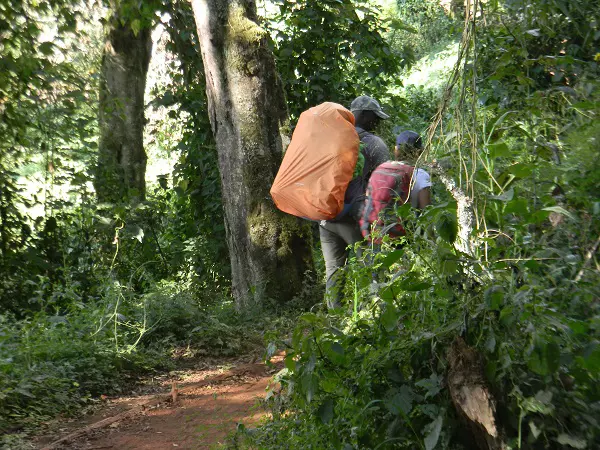
Climbing Kilimanjaro is more than just an adventure; it’s a monumental journey that tests the limits of human endurance and spirit. The success of this journey heavily relies on the unsung heroes of every trek—the porters. As trekkers embark on the ascent to the Roof of Africa, understanding and adhering to the Kilimanjaro porter weight limit becomes essential for a safe, sustainable, and ethical trek. In this comprehensive guide, we’ll delve into the importance of porter weight limits, the regulations in place, and the considerations that contribute to a balanced and responsible climb.
Porters on Kilimanjaro shoulder the logistical burden, carrying essential supplies, camping gear, and equipment, allowing climbers to focus on the challenging terrain and their personal journey to the summit. The well-being of these hardworking individuals is paramount, and respecting porter weight limits is a fundamental aspect of ethical trekking.
The Kilimanjaro porter weight limit is set to protect the welfare of porters and maintain sustainable trekking practices. These regulations are in place to prevent overloading, reduce the risk of injury, and contribute to the overall well-being of the local communities involved in supporting Kilimanjaro expeditions.
As of the last available information (knowledge cutoff in January 2024), the standard Kilimanjaro porter weight limit is set by the Kilimanjaro National Park Authority. Typically, a porter is allowed to carry up to 20 kilograms (44 pounds) of equipment, including their personal belongings. This weight limit is carefully calculated to strike a balance between the needs of the trekking group and the welfare of the porters.
1. Regulations and Ethical Practices: Kilimanjaro’s National Park Authority establishes porter weight limits to ensure fair and ethical treatment. Trekkers are encouraged to adhere to these limits in order to promote responsible tourism.
2. Porter Welfare: Overloading porters can lead to physical strain, fatigue, and potential health risks. Respecting the weight limit is crucial for the well-being of the porters, who play a vital role in the success of the climb.
3. Sustainability: Sustainable trekking practices involve minimizing the environmental impact and respecting the local communities. Adhering to porter weight limits contributes to sustainable tourism on Kilimanjaro.
1. Pack Strategically: Trekkers should pack judiciously, carrying only essential items and following the guidance provided by the trekking company. Lightweight, compact gear can help reduce the overall load.
2. Pre-Departure Briefing: Trekking companies often conduct pre-departure briefings to educate trekkers about the importance of porter welfare and the need to adhere to weight limits. Paying attention to these briefings is crucial for a responsible climb.
3. Use duffel bags: Many trekking companies recommend using duffel bags for personal gear. These bags are easier for porters to carry and can be packed efficiently.
4. Communicate with the Trekking Company: Trekkers should communicate openly with the trekking company about their needs and preferences. This ensures that the company can plan porter loads effectively while adhering to weight limits.
In conclusion, climbing Kilimanjaro is a shared journey. It’s not just about reaching the summit; it's also about ensuring the well-being of those who help us get there. By understanding and respecting the Kilimanjaro porter weight limit, we can contribute to a more balanced, ethical, and sustainable trekking experience.
Sure, here’s a more detailed and humanized version of the content:
The Benefits of Respecting Porter Weight Limits:
1. Porter Welfare: Adhering to weight limits is more than just a rule; it’s a direct way to contribute to the welfare of the porters. It ensures that they can carry out their responsibilities safely and comfortably, allowing them to support the trek without compromising their health and well-being.
2. Ethical Trekking: Responsible and ethical trekking goes beyond the climb itself. It involves minimizing the impact on the environment and showing respect for the local communities that support the trek. Following porter weight limits is a key aspect of ethical trekking on Kilimanjaro, demonstrating respect for the hard work and dedication of the porters.
3. Sustainable Tourism: Sustainable tourism practices aim to preserve the natural and cultural heritage of destinations for future generations. By respecting weight limits, trekkers contribute to the overall sustainability of Kilimanjaro as a trekking destination, ensuring that this majestic mountain can continue to inspire and challenge adventurers for years to come.
Conclusion: Climbing Kilimanjaro is not only a personal achievement but also an opportunity to engage in responsible and ethical trekking practices. Respecting the Kilimanjaro porter weight limit is an integral part of this responsibility. It ensures the well-being of those who make the ascent possible and contributes to a balanced and sustainable climb. By packing thoughtfully, communicating with trekking companies, and embracing the ethos of responsible tourism, trekkers can make a positive impact. As you embark on the adventure of a lifetime, let the spirit of Kilimanjaro extend to the care and consideration shown to those who accompany you on this extraordinary journey—the dedicated porters who make your summit dreams a reality. Remember, the journey to the summit is not a solitary endeavor but a shared adventure, made possible by the collective efforts of every individual involved.